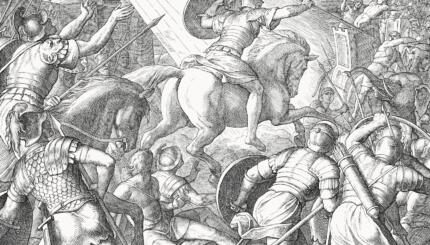A few years ago, I was browsing through a Judaica store. After looking at the books, and the Shabbat candlesticks, and the seder plates, I happened to come across something that never would have even occurred to me. It was a light bulb in a box with the words “Eternal Light.” And right below the words “Eternal Light,” were the words, “Lasts 4000 hours.”
Hanukkah celebrates light — a light that lasted eight times longer than expected. And in fact, the Chanukiah, the nine-branched menorah, is designed to evoke the original “Eternal Light,” the ner tamid which was kept in a seven-branched menorah in the ancient Temple in Jerusalem.
But “Eternal Light” isn’t a great translation for ner tamid. When it’s first described in the book of Exodus, the Torah says, “it shall burn from evening to morning” (27:21). So it seems pretty obvious that the light isn’t supposed last “eternally,” forever and ever. Instead, it’s supposed to be relit every evening. So a better translation for ner tamid might be “a regular light” – a light that requires tending, upkeep and regular maintenance.
A “regular light,” then, reminds us of our ability and our responsibility to bring order out of chaos. In fact, we all intuitively know that nature tends to move towards chaos, not order. If you put unrefrigerated food out overnight, it doesn’t get fresher – it spoils. If you ignore oil changes on your car, it doesn’t run better – it gets more run down. And we all know that the papers in our home or office tend to get more cluttered, not less. This principle of increasing randomness is called “the law of entropy,” and it’s an ironclad law of nature: Unless we actively work to maintain something, the natural tendency of most things is towards deterioration.
We are seeing this all too clearly in our world today — we see racism, guns, terrorism, xenophobia. It’s very easy to feel like our world is deteriorating into chaos. And you know what? Without human agency, without a desire and a will to bring more order, the world will become scarier and less whole.
But the flip side is true, as well. We can be the ones who bring more light. It will be hard, there will be obstacles, and we may not succeed in our lifetime, but as Rabbi Tarfon teaches, “It is not your duty to complete the work. But neither are you free to desist from it.”
So it’s OK if the “eternal light” burns out after 4000 hours, because it’s not supposed to be a miraculous light that lasts forever. Instead, it should be a light that we have to maintain ourselves.
As we light our Hanukkiah each night, placing more and more candles in our window, we remind ourselves that light doesn’t happen by accident. Instead, the Hanukkah lights remind us that it is upon us to bring ourselves – and our society – to a more peaceful and just place.
Torah
Pronunced: TORE-uh, Origin: Hebrew, the Five Books of Moses.



